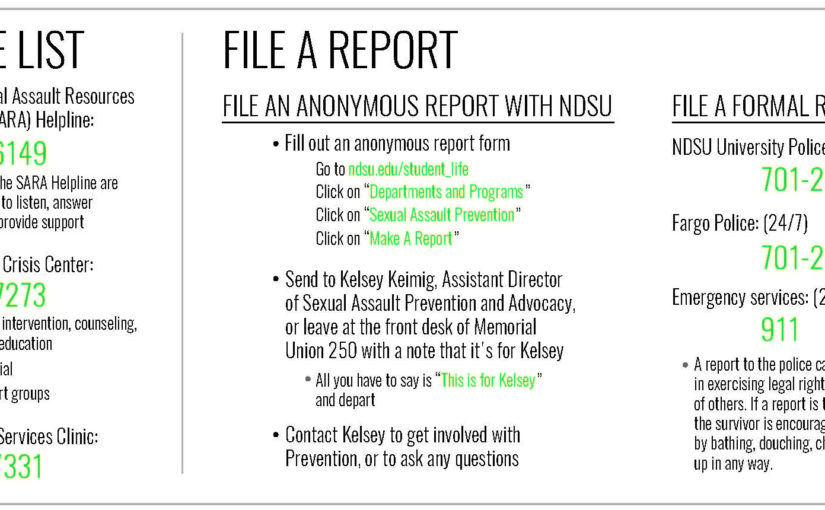After a 50-minute interview, Chelsea Burgan opts not to accompany this story with her photo.
“This isn’t even about myself,” Burgan, 22, says. “At this point, this is more so about other people who spoke up but didn’t get a chance to get justice — or those who didn’t have the ability to speak up.”
She has fallen under both categories. Burgan, a bachelor of fine arts senior at North Dakota State, says she has been sexually assaulted three times in her life. Most recently, she says a coworker raped her New Year’s Eve.
Starting a conversation is the reason Burgan says she’s been vocal about the alleged incident.
“I’m (speaking out) for everyone else,” she says, “so they realize that these things happen.
“It’s not OK. And it’s happened to so many of my friends that I just don’t think there should be any more silence about it.”
Childhood
The first two times Burgan was assaulted, she stayed quiet. A 15-year-old boy molested her when she was 6, Burgan says.
“He died a few months later in a car accident,” she says. “As a child, I took it upon myself to keep it to myself.”
Burgan says she vividly remembers his memorial and classmates wearing shirts that commemorated his life. The small, grieving community and his family didn’t need more pain.
Nine years later, Burgan says she was date raped.
“I was over at a boy’s house when I was 15 years old. And I shouldn’t have been there; I obviously didn’t tell my parents — they still don’t know, but I’m at this point where I just don’t care,” she says. “There’s no point in lying about the things that I’ve been through.”
She says she thinks he slipped something in her drink, “and the next thing I knew, I was getting raped.”
This time, Burgan decided she’d confide to someone about the incident. She told a mutual friend, who laughed it off, Burgan says. Backlash ensued, so Burgan kept it to herself “for the longest time.”
New Year’s Eve
At a bar downtown in Fargo, Burgan and her boyfriend broke up after heavily drinking. She was with him and friends celebrating New Year’s Eve. Burgan kept drinking afterward, which she says was another mistake. In total, she says she had up to 20 drinks that night, mostly of hard liquor. She wasn’t in a healthy state, physically or mentally.
“I started talking about going home and taking all the pills in my house,” Burgan says. “If I would’ve went home, I probably would’ve committed suicide. I was ready.”
She didn’t go home; instead, she found her coworkers and continued to drink until bar close. With a dead phone and without a place to stay, Burgan says one coworker offered a place at his apartment.
“This is at the point where I don’t remember a whole lot,” she says.
Coworkers already had passed out in the living room, so Burgan’s coworker said she could stay in his room. Burgan agreed, and began to undress out of her clothes, which were wet because she’d slipped on the ice.
Burgan says that’s when he started kissing her.
“At first I thought it was OK, but it didn’t feel right because I still had feelings for my ex, and I’ve had the worst night of my life,” she says. “So I told him to stop.
“But he, at that point, was already on top of me, and he decided not to stop.”
Burgan says she feared retaliation if she tried to fight back.
“We were both pretty drunk, but I don’t think that a person can get so drunk that their behaviors are dictated by that,” she says. “Stop means stop; no means no. I said at least three different times to stop.”
Aftermath
Burgan says she remembers throwing up after the incident. Even though she was exhausted, she says she couldn’t fall asleep. Burgan found a phone charger and called her friends Kristy and Jake to pick her up. She says she waited to sober up before deciding how to proceed.
“I started remembering back to when I had been previously sexually assaulted and kept it to myself, and how detrimental that has been to my mental health,” Burgan says.
She reached out to one more person.
“I told my dad about it, and he was pretty shocked,” she says. “ … He said, ‘That was very much sexual assault. You were raped. It is completely up to you what you would like to do. From this point on, whatever choice you make is the right choice.’”
Burgan still hadn’t eaten, and suicidal thoughts remained with her. She determined, though, that she’d go to the hospital. Medics conducted a rape kit test. After three hours, Burgan decided she was going to pursue charges.
“He needed to know what he did was wrong, so that this doesn’t happen to somebody else,” Burgan says. She later told her coworkers what had happened. They minimized her story, excusing his actions on their drunkenness and brief past relationship.
Soon after, Burgan checked into Prairie St. John’s, a psychiatric hospital in Fargo, for five days of in-patient care. While there, she says she learned from patients and doctors on how to healthily cope.
She also says she was sexually harassed by two older men who were also in the unit.
In a blog post, though, Burgan says this interaction “didn’t trigger anything inside of me to breakdown and relapse because of my own trauma. That’s when I truly knew I was in a good mindset.”
She has since stopped going to work, for her employer couldn’t promise that Burgan wouldn’t work with the coworker. She’s taken the semester off from school.
Mental health
There have been ups and downs since checking out of Prairie.
Burgan says she bottomed out with her mental health last week. She couldn’t get out of bed and hasn’t eaten much. She faults her recently diagnosed post-traumatic stress disorder for the decline. Burgan says a psychiatrist has also diagnosed her with major depressive disorder and general anxiety disorder.
“Which is super crazy and scary for me to think about, but these things are very real,” she says.
Burgan says she regularly visits her counselor at NDSU and a psychiatrist. She stresses you need to get help when you’re ready for help. For her, Burgan says she had to hit rock bottom, get inked with reassuring tattoos and have a writer reach out to her to tell her story.
Burgan says, “I was like, ‘All right, there’s a time and a place, and this is a sign that I need to finally take that step and talk to Kelsey (Keimig).’”
Justice
Keimig, the assistant director of sexual assault prevention and advocacy at NDSU, is an on-campus ally for victims. Through her office, survivors can find options.
She says reporting within the university system differs from the legal courts.
“With Title IX and with the campus process, we have a different evidentiary standard,” she says. “Criminal is beyond reasonable doubt. Well, the criminal system does not work well with cases of interpersonal violence.
“It’s broken, in that respect. We know that. That’s why we have these on-campus options.”
Burgan says she may pursue filing a report through that process, especially since she won’t receive her day in court. Two weeks ago, the state prosecutor’s office notified Burgan that it wouldn’t press charges due to insufficient evidence.
“They also decided to remind me that ‘it’s not saying that what happened didn’t happen, but we don’t have enough evidence to prove what happened happened,’” she says.
Burgan says her former coworkers think that if the state isn’t pressing charges, what happened isn’t wrong. Which, she says, is wrong.
“Whether you get justice or not, it doesn’t mean that it didn’t happen. Not even close,” Burgan says.
At the university level, an investigation includes interviews, collecting evidence and a review by the deputy Title IX coordinator, Janna Stoskopf.
“It really changes the picture,” Keimig says.
Burgan says that picture is fairer to the victim.
“Rape is rape,” she says. “It’s very black and white. There is no gray area with this situation.”
Response
Burgan has doubled-down on her condemning of the incident and sexual assault in general, particularly on social media. The responses she’s received have been overwhelmingly positive, though anonymous messages posted criticized her.
“Some of them were saying things like, ‘Why are you putting all your personal shit on Twitter and social media?’ ‘There are some of those things that should be kept to yourself,’” Burgan says.
She says she knows not everyone will be supportive of her and the discussion she’s starting. Supposed friends have been weeded out.
“But I’m going to talk about these things because that’s why they’re still a problem — we’re not talking about them,” Burgan says. “Eff whatever you think; I’m going to do this for me and for others who didn’t get justice.”
Keimig says the most recent campus study, conducted by her office and professor Amy Stichman in 2011, indicated that 24 percent of NDSU students have experienced sexual violence. Of that 24 percent, 21 percent of respondents were women; three percent were men.
Since 2011, Keimig says, activism and advocacy has shed more light on the situation.
“I feel like campus has caught fire with this whole situation, and it’s becoming more and more real for people,” Burgan says. “They’re becoming more like activists, and I truly appreciate that because that should’ve happened a long time ago.”
Recovery
Burgan’s laugh, and smile, fill the cozy office.
“Honestly, the past few days have been great,” she says, noting that she’s been more productive and has had less anxiety and depression.
She’s also been able to be at home alone — along with her cat, Raven. Before, Burgan says she spent a lot of her time at the Sigma Alpha Epsilon fraternity house.
“Because I felt safe,” she says. “Those boys have really been protective over me in this situation. I feel like they’ve gotten a lot of backlash, but a lot of things have changed in that fraternity. I really want to say thank you to them.”
Despite the situation, Burgan has lots of thanks to give to her support network.
“Talking about it really puts it in perspective how many people actually do care,” she says. “I had no idea. I knew that I had a lot of friends; I didn’t know I had the support system that I had.”
As for other victims of sexual violence and trauma, Burgan and Keimig have a message for them: Take your time, do what’s best for you and share when you’re ready.
“Not a lot of people are ready to be brave, and that doesn’t say anything less of them,” Burgan says. “You shouldn’t do something that is against your will.”
“When people decide that they’re ready to share, they will be believed,” Keimig says. “They will be supported here.”
In particular, Burgan says confiding in one other person is the most important step. It could be a friend or professional, like the NDSU counseling center.
“They’re focused on you, and they’re very objective,” she says. “ … If anyone is going to know how to handle the situation the best way possible, it’s going to either be the counseling center or Kelsey.”
The center and Keimig, along with providers at Student Health Services and the SARA hotline, are confidential.
“I’m on the road to recovery now,” Burgan says. “I hope to encourage people to speak up about things that they’ve been through, whether it be sexual assault or not.
“Because we’re all human. Humans make mistakes. Humans go through a lot of things. And we’re based on our interactions with each other. And I think that it’s silly to say that no one cares about you.”

